Theresa May’s tough line on immigration punishes British children
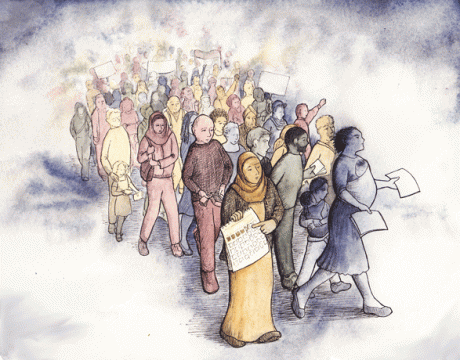
A series of Shine A Light reports from the frontline of Britain’s immigration and asylum system. This piece was first published on Shine A Light and Red Pepper magazine. It was funded by Shine A Light and Red Pepper’s Black Journalism fund.
‘To them it’s just another number, someone else being sent back. But when you’ve got three children being left without their dad… it’s quite major.’
Tom was about to leave for school when they came.
He was putting his shoes on by the front door of the small flat he shares with his mum, dad and two younger brothers. He heard a loud thud, something heavy hitting the front door. Then a bang. Another bang. The noise hurt his ears. In their bedroom, Tom’s mum and dad were, confused. Who was trying to break down their door?
Amid the noise, shouting: ‘Immigration and police! Immigration! Police!’
Tom’s mum Leah ran toward the door, shouting: ‘Stop, stop, I’ll just open the door.’ The front door flew off its hinges. Half a dozen officers in uniform charged into the house, into the kitchen, bathroom and main bedroom. They’d come for Michael. As they led him away, neighbours on the estate stood watching.
Inside the house, some officers stayed to interrogate Leah. Who lives here? What about the children? Leah was shaking. Tom, 12, and his younger brothers, Zackey, aged four and Jermaine, 10, were terrified.
A female officer noticed the children. Her manner softened. She tried to answer Leah’s questions. She said Michael was on that morning’s list of people being rounded up for deportation.
There had been no warning, Michael was in the ‘system’, but no one told them this could happen. The officers hadn’t even rung the doorbell.
Michael had an ongoing case with the Home Office, Leah said, he was challenging his removal from the country. The officer replied, No, he hasn’t got anything lodged with the Home Office. That’s why we’ve come to get him. ’That’s not true,’ said Leah. ‘I know that’s not true.’
Well, if what you say is correct then it’s not a problem, he can sort it out. But still they took him away. Later he would call her from an immigration lockup near Gatwick Airport. It’s called Brook House. Two people recently died there.
It was Thursday, Leah’s day off. From now on Leah would spend her Thursdays fighting to stop the Home Office forcing Michael onto a plane to a Caribbean island, 4,000 miles away from his family. She would learn fast.
Why is he still here? Why doesn’t he just go? The children will be fine without him
She would learn to explain things she’d never had to put into words before, not to strangers anyway. That her children needed their dad, that she and Michael had a real relationship, that it just wasn’t fair. But each time, Michael’s Home Office caseworker would say: Why is he still here? Why doesn’t he just go? The children will be fine without him.
All that would come later. For now, the day of the raid, Thursday 26th January, a friend called round and took the bewildered children to school. Leah waited alone for the council to send someone to fix the door.
Michael had arrived in the UK in 2001 aged 19, scared and shaken after a run in with local gangsters back home, a small town in the West Indies.
He had witnessed a murder and thwarted a drug deal, four local gang members came looking for him. They shot him in the back and carried him off to a warehouse. He was beaten, stabbed, burned with cigarettes, still bears the scars. They demanded his parents pay a ransom. When they paid part of it Michael was dumped on the streets. He spent three days in hospital, then local police advised him to leave the country for his own safety.
Michael chose the UK where his nan and grandad lived. For a few years, he lived with them in the north of England then moved down to London with his cousin. Michael was a car fanatic: ‘Fixing, driving, mechanics, electronics.’ When he first arrived, he applied for college but couldn’t afford the fees. He was granted leave to remain and was permitted to work but wasn’t entitled to subsidised or free education. Michael began working at a garage in South London and became a father to two children (now young teens — this was before he settled down with Leah). Eventually he set up his own garage. ‘Things were good,’ he said.
Then came 2008: the economy crashed, banks collapsed and Michael’s garage struggled. ‘Everything went wrong,’ he said. Michael made some bad decisions. He borrowed money from a murky source — a little under £10,000 — which turned out to be drug money. He was convicted of money laundering. The judge, making an example of him, sentenced him to five years in prison.
He served his time and was released in 2011. Michael’s probation report described him as low risk all round: low risk to the public and low risk of reoffending. He spent the last five months of his sentence at an open prison in Kent, free to spend away days with his family.
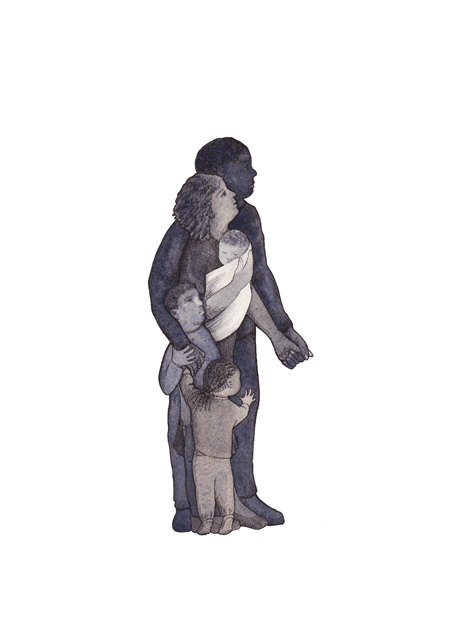 On release Michael set about trying to rebuild his life. His garage had long since collapsed, but he found work as a parts technician. ‘It was good and steady work,’ he said. Leah gave birth to Zackey, and Michael stayed out of trouble. In 2014, the family planned a holiday and Michael applied to renew his passport. Things were good.
On release Michael set about trying to rebuild his life. His garage had long since collapsed, but he found work as a parts technician. ‘It was good and steady work,’ he said. Leah gave birth to Zackey, and Michael stayed out of trouble. In 2014, the family planned a holiday and Michael applied to renew his passport. Things were good.
***
But while Michael was moving on with his life, the political rhetoric against migrants was becoming increasingly hostile.
The tabloids have had a longstanding habit of using the terms ‘refugee’ and ‘asylum seeker’ became as terms of abuse. ‘Blunkett “right to lock up refugees’’,’ shouted one Daily Mail headline in 2001, referring to the hardline Labour Home Secretary David Blunkett. ‘Asylum fraud chaos’ and ‘SCANDAL AS ASYLUM SEEKERS GO ON RUN’ yelled the Daily Express in 2003.
Antipathy turned toward foreign national offenders in 2006 when then Home Secretary Charles Clarke admitted that 1,013 migrants had been released without being considered for deportation. At the time, the law required that foreign offenders sentenced to 12 months or more in prison be considered for removal.
The Home Office was attacked by the Public Accounts Committee and in the Commons. Public pressure mounted. ‘Home Office blunders left foreign rapists in UK,’ shouted the Daily Mail. And ‘Killer’s human rights placed above public safety‘. In response Prime Minister Tony Blair sacked Charles Clarke, and replaced him with hardliner John Reid who promised a stricter regime at the Home Office. He wanted deportation to be automatic for any foreign nationals who received ‘significant’ jail sentences. An intention subsequently embodied in the UK Borders Act 2007, which resulted in automatic deportation, irrespective of personal circumstances, for those imprisoned for 12 months or more.
Academic and migration expert Luke de Noronha has traced a line from this period, when foreign national offenders first entered the public consciousness as figures of hate and fear, to now. He writes: ‘Today, conversations about immigration control rarely proceed without reference to these unequivocal ‘baddies’. Their notoriety might appear self-explanatory: they are migrants andcriminals, and most British people don’t like either.’
Tony Blair sacked Charles Clarke, and replaced him with hardliner John Reid who promised a stricter regime at the Home Office
Initially, none of this impacted on Michael. He served his sentence, returned to his family and heard nothing from the Home Office. But in 2013 the Coalition government stepped things up a gear up with a plan to dramatically increase the number of foreign prisoners it deported. The plan covered three departments, several ministers and would entail a ‘tougher environment’ for migrants with convictions.
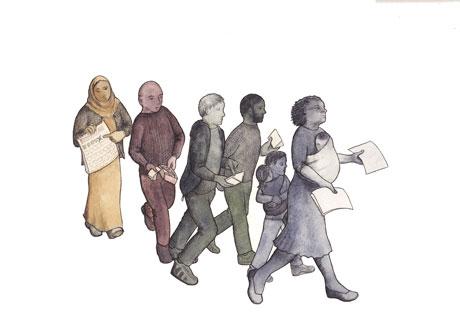 It was part of the then Home Secretary Theresa May’s desire to create a ‘hostile environment’ for migrants and refused asylum seekers. More Home Office case workers were hired to systematically seek out foreign national offenders and deport them. The net widened to include people who had served sentences of less than 12 months.
It was part of the then Home Secretary Theresa May’s desire to create a ‘hostile environment’ for migrants and refused asylum seekers. More Home Office case workers were hired to systematically seek out foreign national offenders and deport them. The net widened to include people who had served sentences of less than 12 months.
This ‘hostile environment’ was given legal effect by the Immigration Acts of 2014 and 2016, which turn doctors, landlords and bank managers into border guards; obliging them to check a person’s migration status and refuse to treat them, rent to them or allow them to open a bank account if they lack the right papers. Those professionals who refuse or fail to carry out these checks face criminal and civil sanctions.
Operation Nexus was one another feature on the landscape of the ‘hostile environment’. Nexus purports to target serious, dangerous criminals for deportation, Home Office and police forces across the country share information to catch these ‘high-harm’ individuals.
A policy setting out to achieve these objectives might appear uncontroversial. But the reality is that Operation Nexus scoops up anyone who has had contact with state authorities, whether through stop and search, activism, or an old or non-violent conviction.
While leading research at the University of Bristol on the family lives of men facing deportation from the UK, academic Melanie Griffiths witnessed the reality of Nexus at immigration tribunal hearings. ‘The rhetoric is usually about “high harm” individuals, with a lot of reference to “gangs”, but actually in my experience the people that get caught up are often only involved in very, very low criminality, if at all,’ she says.’And yet aged 18 they are told that they are being sent to Somalia, say, by themselves, even though they haven’t seen the country since they were three. Such cases seem like an over the top response to what is basically a teenage kid that the police doesn’t like very much.’ 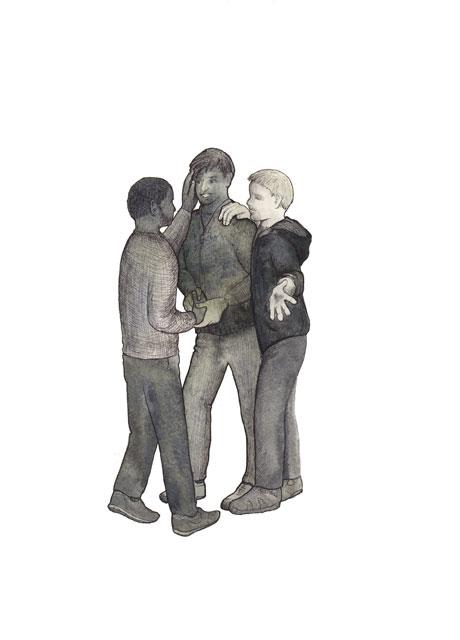 Even those acquitted of criminal charges can be deported. Rough sleepers on the street are rounded up by charities and police officers. If they’re foreign, they’re handed over to immigration officials. Some are deported, others are locked up in immigration detention, while the Home Office builds a case against them. Cuts to legal aid for immigration cases, introduced by the Coalition Government in 2013, make it difficult to challenge detention and impending removal.
Even those acquitted of criminal charges can be deported. Rough sleepers on the street are rounded up by charities and police officers. If they’re foreign, they’re handed over to immigration officials. Some are deported, others are locked up in immigration detention, while the Home Office builds a case against them. Cuts to legal aid for immigration cases, introduced by the Coalition Government in 2013, make it difficult to challenge detention and impending removal.
To effect the removal of those rounded up as part of Operation Nexus, mass charter flights carrying people to the Middle East and Africa are booked in advance, and immigration officers are under pressure to fill them. The flights are kept secret with people taken late at night or in the early hours of the morning, and deported before they can challenge the state’s case against them. That this can happen is a consequence of changes to the Immigration Rules introduced Theresa May during her tenure as Home Secretary, meaning some people could appeal their case only after deportation. In reality few are able to exercise this right once they are outside of the UK.
Yet aged 18 they are told they are being sent to Somalia, even though they haven’t seen the country since they were three. Such cases seem like an over the top response to what is basically a teenage kid that the police doesn’t like very much
In 2014, as the government’s plans unfolded, Michael and Leah happily planned a holiday. They would take the children to Euro Disney. Michael applied to renew his passport. That same year, he was stopped and search by the police — a routine occurrence for many black men in London. On two occasions, as the officers took his details they said: Immigration has got a serious interest in you.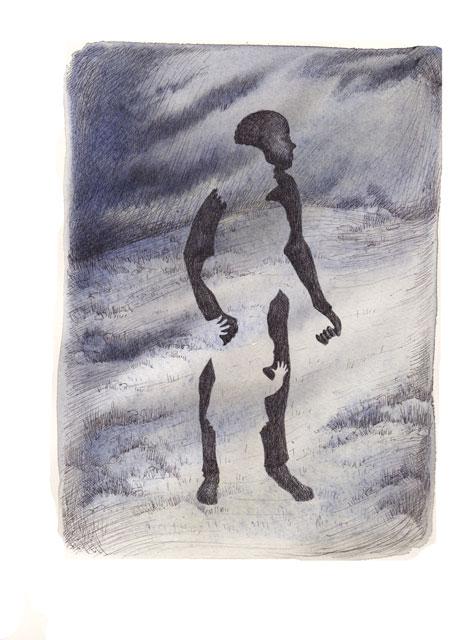 Michael went to see a solicitor. ‘Why would immigration be interested in me?’ He thought it might be to do with the passport, but his solicitor said: Well, you have a criminal conviction. Still, Michael had been clean since his release, he wasn’t worried.
Michael went to see a solicitor. ‘Why would immigration be interested in me?’ He thought it might be to do with the passport, but his solicitor said: Well, you have a criminal conviction. Still, Michael had been clean since his release, he wasn’t worried.
Then came a letter from the Home Office. It ordered him to ‘stop working, stop using the NHS’ and to sign on once a week at a Home Office immigration reporting centre in London Bridge.
Michael re-applied for leave to remain in the country. Early in 2015 his application was refused. The Home Office increased his reporting requirements to twice a week, this time in Croydon. Again, he was told not to work but this time his driving license was taken away as well. Michael tried to keep the family together, applying for different types of British residency as a carer for his children. Both applications were refused.
With Michael unable to work Leah had to rely on working tax credits to boost her income. Michael for his part loved the extra time with his three boys. He took them to school, helped them with homework. But he needed to be earning and found himself increasingly depressed unable to do so; a state of mind compounded by the uncertainty of his situation.
This uncertainty and stress lasted nearly two years before the raid in January 2017 and Michael’s subsequent detention. Looking back, Michael says: ‘If I was the person who they made me out to be, I would have turned to crime. I can’t work, I can’t look after my family. What do you want me to do?’
For the children, their lives are divided into the time before and after the raid. Before the immigration raid they had their dad, he took them to school, played football with them. After the raid, he wasn’t in their lives any more. Not like before.
Every Sunday their mum drove them for nearly two hours through central London beyond the M25 to the place that looked like a prison. Brook House. They had to go through security, their bags searched. They would meet him in the visitor’s room. He could get up to say ‘Hello’ but that was it. Physical contact, such as hugs, were prohibited.
Week after week, Michael watched his children change and worried about the effect his situation was having on them. ‘Jermaine is worried. Zackey is playing up. His mum is at work and when I was there we were close. Now I’m not there. Tom don’t show any emotion, he won’t tell you what he is thinking.’
Michael appealed against the decision to remove him from the UK arguing that removal would result in a breach of his article 8 right to a family life. He wanted to stay in the UK to be a father to his five children in the UK and a partner to Leah. Using her Thursdays off, Leah worked on gathering evidence for Michael’s case. There were letters from the children’s teachers, the local dentist, her own boss and another school mum to testify that Michael was part of their lives.
The Home Office response was that Leah and her children would manage fine without Michael.
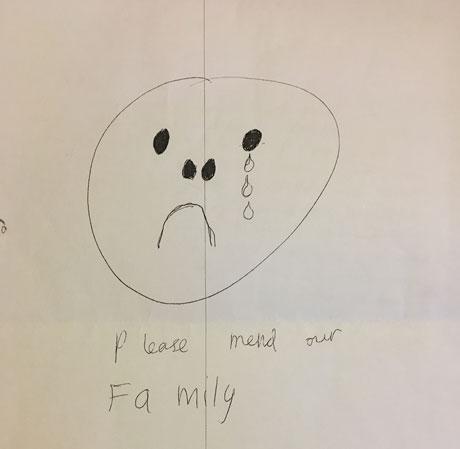
A child’s plea: Jermaine’s drawing
‘Kids need their dad,’ Leah said. ‘You hear sometimes the government placing emphasis on the reason that things are going wrong is single parent families and dads not looking after their children. All that sort of stuff. But, yet they are causing that to happen. I don’t understand.’
Leah was mostly worried about Tom. They live in an area where boys could get into trouble with gangs. ‘It’s quite a lot easier to get involved in that without his dad around,’ she said. ’Growing up in London. You just hear about all these stabbings.’
The children wanted to help with the case. Tom tried start a gov.uk petition to call on the government to ‘stop deporting dads’. A few of his mates were going to sign it. It was rejected.
Leah went to see a social worker to get evidence to support their case. The social worker said it might be Zackey she had to watch: ‘You are more worried about the older boys, but they’ve had their dad with them to this stage. By the time the little one gets to their age, he wouldn’t have had his dad around for much longer.’
The children wanted to help with the case. Tom tried start a gov.uk petition to call on the government to ‘stop deporting dads’. A few of his mates were going to sign it. It was rejected. They said Michael’s case was still ongoing, so the petition wasn’t valid.
Jermaine, 10, hand wrote a letter to one of the judges hearing Michael’s case while he was detained:
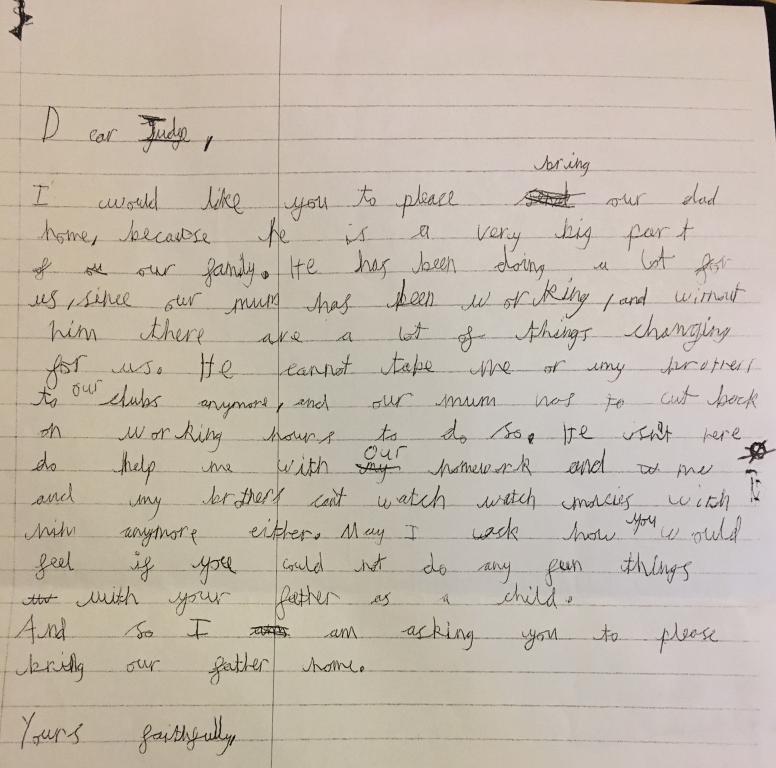
Dear Judge,
I would like you to please bring our dad home because he is a very big part of our family. He has been doing a lot for us, since our mum has been working, and without him there are a lot of things changing for us. He cannot take me or my brothers to our clubs anymore, and our mum has to cut back on working hours to do so. He isn’t here to help me with our homework and me and my brother can’t watch movies with him anymore either. May I ask how you would feel if you could not do any fun things with your father as a child. And so I am asking you to please bring our father home.
Yours faithfully, [Jermaine*] (middle son of [Michael])
Michael applied for bail in a bid to stay with his family while his appeal was considered. The bail hearing, on February 28th, was held at a tribunal court in London, Michael appeared via video link and Leah was there in person. There’s no legal aid for immigration bail hearings so they hired a private solicitor, borrowing and using their savings. Before the hearing, they worried that Michael would be denied bail and remain in detention until he won his appeal. What happened was worse. There was no point in granting bail, the Home Office lawyer said at the hearing, because Michael was booked on a charter flight for 8th March. Eight days away.
***
Leah sprang into action straight after the hearing. She contacted her MP and their solicitor lodged a judicial review of the decision to place Michael on the charter flight. They didn’t get a response from the Home Office. Leah panicked. The charter flight to Jamaica was due to leave at 6am on 8th March. Michael prayed. When he called his mother to tell her, she cried. She lives in America now, most of his family long since emigrated.
Then, the day before the flight, Michael’s solicitor told him his ticket had been cancelled.
That night Michael went to bed, naked under the covers. ‘Brook House is hot.’ At around 10pm there was a knock at the door and two guards came in.
You’re on a flight, one said.
‘No, I’ve got this JR, my ticket’s cancelled,’ Michael replied.
OK, we’ll go check.
They returned a few minutes later with more guards.
You are on the reserve list.
Michael was confused. The guards swooped to restrain him. He yelled. They bent his wrist and arm, one guard had his hands around Michael’s neck. Michael, still naked, struggled and tried to free himself. One of the guards squeezed his testicles. He gave up and went limp.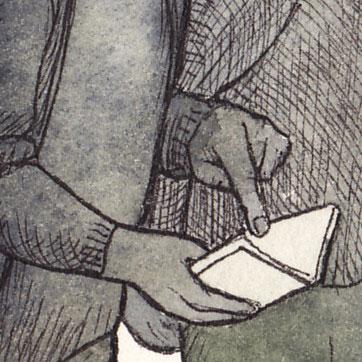
A guard pulled some boxers onto him, then they strapped a restraint belt around his waist and strapped his arms. Another set of guards took him and drove him to the airport.
Leah heard what happened by text, from Michael’s roommate. ‘That’s it, he is actually going,’ she said. ‘It’s final. I just thought there’s no chance of him coming back really. They say it’s an out of country appeal but I don’t know how many people have managed to appeal and come back. I can imagine it’s very minimal. It is far… It’s not like we can afford to just go there. Especially with three children.’
‘To the Home Office it’s just another number, someone else being sent back. It doesn’t really affect them. But it’s a big thing… when you’ve got three children being left without a dad. It’s quite major. I now have to bring them up on my own.’
A second chance?
Leah was still crying when Michael called her from the security guard’s van to say they weren’t taking him after all. Last minute cancellations are common. Michael was certain that the guards knew before they drove him to the airport that he wasn’t on the flight, but they kept him in the van all night anyway.
The guards who drove Michael to the airport are employed by Tascor, a security company to whom the work of ‘escorting’ people from detention to the airport has been outsourced.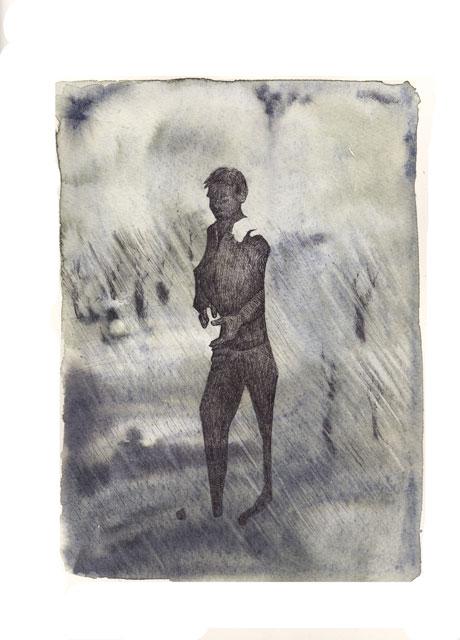 Michael spent the night in the van thinking about the past. ‘I was not a criminal really. I just got caught up. It was a mistake that I’m paying for. That was when I was 25. I’m going to be 35. I’m not the same person.’
Michael spent the night in the van thinking about the past. ‘I was not a criminal really. I just got caught up. It was a mistake that I’m paying for. That was when I was 25. I’m going to be 35. I’m not the same person.’
Two days later the Home Office requested issued further removal directions, beginning the process again. And again, Michael tried to appeal. ‘It all seemed to run smoothly,’ said Leah. ‘The judge was on our side. The Home Office didn’t put up too much of an argument. To me and the solicitor it went quite well.’ But the judge reserved his decision: taking time to consider the case before giving his judgment.
Following the appeal hearing Michael applied for bail again but his application was refused. It was the judge dealing with Michael’s bail application who dropped the bombshell that his appeal had been refused. That was the first Leah and Michael had heard of it. There’d been no letter. ‘It seemed to go so well,’ said Leah. ‘I don’t understand what could have gone wrong.’
A week later, on the 9th May, Michael was deported.
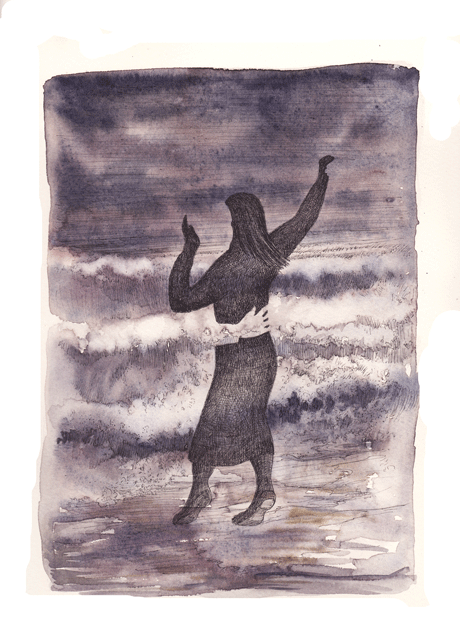
Seated on the plane Michael still believed a miracle might save him. ‘He’s always hopeful,’ said Leah. ‘But I don’t see how.’
Twice that day he spoke to me by phone, first as he was being driven to the airport. His voice trembled. He sounded scared to me. Then, when he was on the plane, sitting between two guards, I called him again. ‘I’m fearful for my life,’ he said. ‘I wonder what’s going to happen to my kids.’ Then the line went dead.
At the time of writing, Tom, Jermaine and Zackey do not know that their father has been deported. Tom and Jermaine have exams coming up and it is Jermaine’s birthday Thursday. Leah cannot face telling them. Not yet.
For her part, Leah has had little time to grieve. And acceptance will be a long time coming ‘If he was born in this country he would have just served his time and then been allowed to get on and bring up his kids like he is supposed to do. But just because he wasn’t born here, not only him, but all his children have to now be punished for the rest of their lives. It just sounds ridiculous. I don’t understand it.’
*Michael, Leah and their children’s names have been changed to protect identities.
Illustrations by Carrie Mackinnon. All rights reserved.







